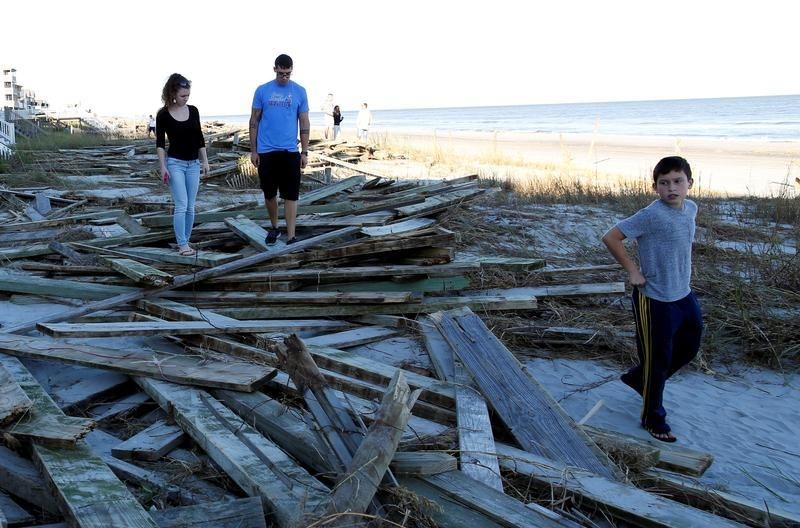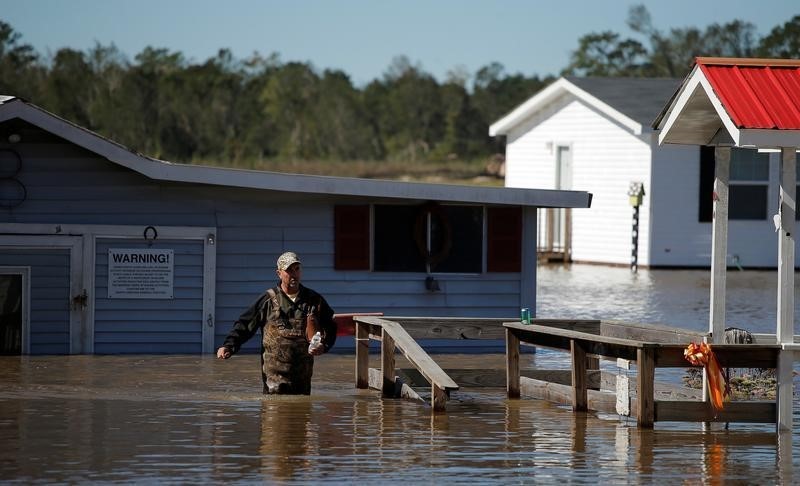
By Judy Royal
CAROLINA BEACH, N.C. (Reuters) – Residents of the southeastern United States ravaged by Hurricane Matthew turned their focus on Monday toward recovery and clean-up, but officials in several states warned that deadly flooding could continue as swollen rivers crest in the coming days.
Matthew, the most powerful Atlantic storm since 2007, was downgraded to a post-tropical cyclone on Sunday after its rampage through the Caribbean killed 1,000 people in Haiti.
In the United States, the death toll rose to at least 19 people.
While power was being restored in some areas, 1.6 million people were without power in Florida, Georgia, North and South Carolina and Virginia, down from Sunday’s peak of 2.2 million. Officials were working to clear streets of fallen trees and abandoned vehicles.
With five people reported missing and rivers rising, North Carolina Governor Pat McCrory said he expected the death toll to rise. Eight people in the state were known to have died so far.

People look around the debris of the pier damaged by Hurricane Matthew in Surfside Beach, South Carolina, U.S. October 9, 2016. REUTERS/Randall Hill
McCrory said several swelling rivers were expected to hit record levels and would not crest for days.
“Hurricane Matthew is off the map, but it is still with us and it is still deadly,” he said.
The National Weather Service said “life-threatening flooding” would continue on Monday over eastern portions of the state.
Many coastal and inland communities remained under water, either from coastal storm surge or overrun rivers and creeks.
All 2,000 residents of Princeville, were told on Sunday to evacuate due to flash flood risks. The town lies on the Tar River about 25 miles (40 km) north of Greenville.
Several dams have breached in the area around Cumberland County, south of Raleigh, Michael Martin, fire marshal for the city of Fayetteville, said by phone.
Swiftwater rescue teams are still on alert and there have been 255 water rescue calls and 701 people rescued.
In neighboring South Carolina, a vehicle trying to cross a flooded roadway in Florence County was swept away by flood waters, killing one person, Governor Nikki Haley said.
Jake Williams, a resident of Florence, said on early Monday that his power had been out since Saturday morning.
“Trees are down in every neighborhood on almost every road,” he said, adding “I am no weather man, but would guess that the gusts of wind were near 100 mph (160 km), and with soggy ground a lot trees couldn’t stand up to it.”
In Virginia Beach, the city said it had received over 13 inches (33 cm) of rain and 55,000 people remained without power on Sunday night. The city said that some 200 vehicles were abandoned and many roads remained impassable.
Norfolk, which declared a state of emergency, said efforts were under way to clear streets of debris and abandoned vehicles with city offices, libraries and recreational centers set to re-open Monday.
ROOFTOP RESCUE
The storm center was about 200 miles (320 km) off the coast of Cape Hatteras, North Carolina, and heading away from land, according to the National Hurricane Center’s Sunday 5 p.m. (2100 GMT) report. It discontinued all tropical storm warnings.
The storm still packed hurricane force winds as far as 90 miles (150 km) from the center and tropical-storm-force winds 240 miles (390 km) away.
U.S. President Barack Obama declared a state of emergency in Georgia and Florida, freeing up federal money to help the states repair damaged infrastructure and remove debris.
McCrory said 334 rescue workers risked their lives carrying out 877 rescues overnight.
In one of the dramatic rescues in North Carolina, out-of-state firefighters helped save three people from the roof of an SUV in inland Cumberland County, where more than 500 rescues took place.
Flash flooding turned a creek into a “roaring, raging river” that swept the vehicle off the roadway on Saturday night, said Battalion Chief Joe Downey of the Fire Department of New York. He was part of a team from three states that carried out 64 rescues on Saturday night and Sunday morning.
“Water was almost up to the roof of the SUV,” Downey said in a telephone interview. “It was bad. They had nowhere to go.”

Anthony Branch carries belongings from his home as flood waters rise after Hurricane Matthew in Lumberton, North Carolina October 9, 2016. REUTERS/Chris Keane
Though Hurricane Matthew has moved out to sea, the Atlantic hurricane season, which runs until Nov. 30, remains active.
The National Hurricane Center said on Monday morning that tropical storm Nicole was expected to strengthen into Tuesday. The storm is around 500 miles (800 km) south of Bermuda and moving northward towards the island.
(Additional reporting by Harriet McLeod in Charleston, S.C., Eric Johnson in Seattle, and Frank McGurty, Chris Michaud and Gina Cherlus in New York, Writing by Timothy Mclaughlin; Editing by Alison Williams)




